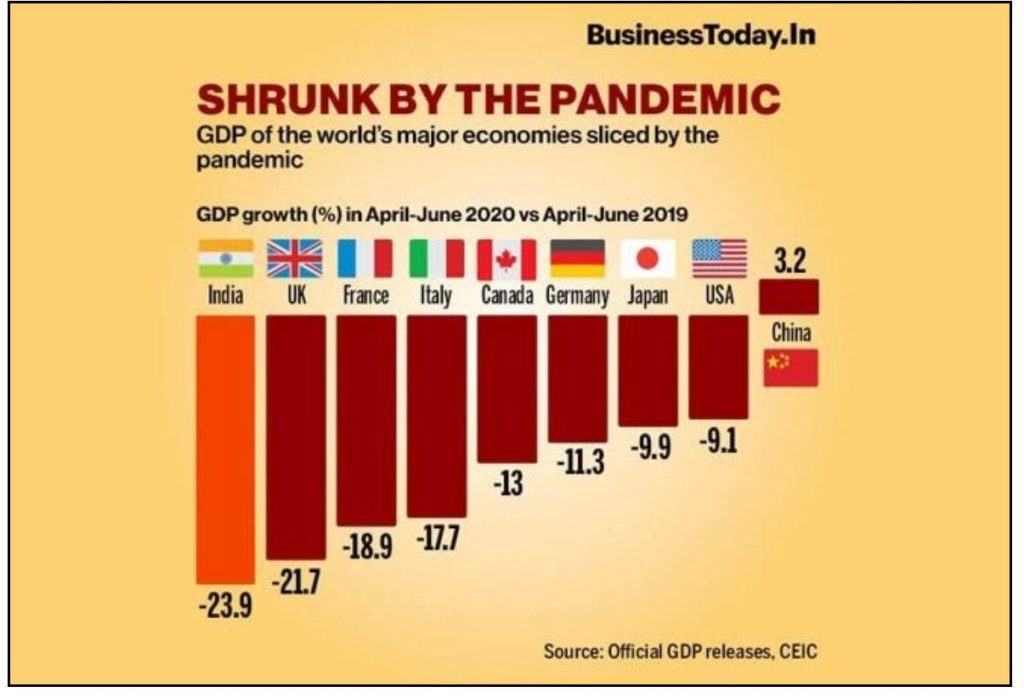As per the United Nations Economic and Social Commission for Asia and Pacific report, released on Tuesday, India’s economic output in 2021 is expected to remain below the 2019 level.
This comes despite full-fledged roll-out of the vaccine to deal with the pandemic. Produced annually since 1947, the Economic and Social Survey of Asia and the Pacific is the oldest United Nations report on the region’s progress.
According to the ‘Economic and Social Survey of Asia and the Pacific 2021: Towards post-COVID-19 resilient economies’, India is estimated to record an economic growth of 7 per cent in 2021-22, over a contraction of 7.7 per cent witnessed in the previous fiscal.
The prediction comes on account of pandemic’s impact on normal business activity and is in contrast to the reports by IMF and Moody’s which predict India’s economy to grow by a significant 11.5% and 12.6% respectively.
It is to be noted that Indian economy had already been showing signs of slowdown at pre pandemic level. Thus, observing that India entered the pandemic with subdued GDP growth and investment, the report emphatically stated that, “Following one of the most stringent lockdowns in the world, the economic disruptions that the country experienced mounted in the second quarter of 2020.”
Though, India might have entered the pandemic with a subdued GDP growth, but India’s impressive growth policies, a subsequent change in lockdown policies and success in reducing infection rates supported an impressive economic turnaround in the third quarter, when India rebounded by coming out of the technical recession by registering 0.4% growth. India’s success can also be attributed to the pent-up demand in India and the festive period which gave an impetus to the growth of the GDP in the economy.
However, it is to be also noted that the pace of recovery moderated in the fourth quarter with estimated year-on-year growth still close to zero.
The report added that “Despite a robust reduction in new COVID-19 cases and the start of vaccine roll-out, India’s 2021 economic output is expected to remain below the 2019 level,”.
Meanwhile, the report also maintained that maintaining low borrowing costs while keeping non-performing loans in check would be a challenge, as India is again witnessing a surge in its new covid cases. To add to the list of woes of India, in a recent report by the Moody’s Analytics, India’s inflation growth has been found to be “uncomfortably high”, with retail inflation rising up to 5% in February on account of 26% rise in the crude oil prices since the covid peak.
With rising CPI, RBI will have to cut down on its rate cut policy which will make it difficult for it to maintain low borrowing cost. This will have an adverse impact on the economy, as for India’s economic output to grow, economy needs low interest rates and an accommodative stance of the RBI to support investment and consumption in a low economic environment.
The report further maintained that China’s swift and effective response to COVID-19 enabled it to become the only major economy worldwide to achieve a positive annual economic growth rate in 2020. Where many major economies around the world witnessed negative growth during the pandemic, China’s economy was the only economy to register a positive growth of 2.3%.

Additionally, the report also forecasts that on an average, developing Asia-Pacific economies are expected to grow by 5.9 percent in 2021 and 5 percent in 2022, after having experienced an estimated contraction of 1 percent in 2020.
The report stated that “Despite a reasonably strong rebound expected in 2021, a ‘K-shaped recovery’ is likely, with poorer countries and more vulnerable groups marginalized in the post-pandemic recovery and transition period,”.
As it is known, the rate of vaccine approval and distribution is not the same for many countries, with marginalized countries performing the worst. Therefore, for a more robust and inclusive recovery, the report suggests a more synchronized COVID-19 vaccination programmed across countries and also highlights opportunities to leverage regional cooperation.
At the same time, it recommends that fiscal and monetary support should be sustained, as premature tightening could increase long-term scars.

